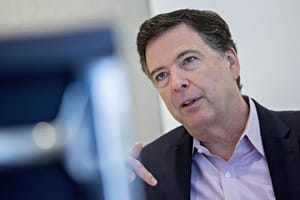
Chuck Ross on May 18, 2018
The Justice Department and FBI is fighting tooth-and-nail to avoid giving Congress documents related to a top secret informant who provided information about Trump campaign advisers for the Russia probe.
But the agencies’ resistance is hypocritical given that they appear to be behind leaks of key clues about the source, whose existence was revealed to the public in a May 8 report from The Washington Post.
So far, three articles published over the past 10 days have revealed tidbits of information about the source. And though the name of the informant remains a secret, the clues have touched off intense speculation that the person is a professor who had several contacts with Trump campaign advisers Carter Page and George Papadopoulos.
The FBI and DOJ’s concerns are relayed through a Washington Post article published Thursday. The report details a battle between the DOJ and House Intelligence Committee Chairman Devin Nunes for records related to the top secret source.
The article portrayed Nunes, Trump and other Republicans as being too aggressive with the request and of aiming to “expose” the identity of the source. The premise of that concern is that Republicans plan to release the name of the source, though some GOP lawmakers have pushed back on that assumption.
According to WaPo’s FBI-friendly report, the bureau has been working for the past two weeks “to mitigate the potential damage if the source’s identity is revealed.”
“The bureau is taking steps to protect other live investigations that the person has worked on, and trying to lessen any danger to associates if the informant’s identity becomes known,” WaPo reported.
But in the very same article decrying potential leaks of information about the source, The Post reports new details about the person.
“The source is a U.S. citizen who has provided information over the years to both the FBI and the CIA, as The Post previously reported, and aided the Russia investigation both before and after Mueller’s appointment in May 2017, according to people familiar with his activities,” the article reads.
And that’s just one of three leaks about the source.
In its May 8 article, WaPo reported on the existence of a source for the first time. The newspaper also reported that the source is an American who has provided information to the CIA and FBI. The source’s information has also been provided to the special counsel’s Russia investigation, according to WaPo.
The New York Times reported additional details about the source on Wednesday.
Tucked deep down in an article about the origins of the FBI’s counterintelligence investigation of the Trump campaign is this nugget:
The F.B.I. obtained phone records and other documents using national security letters — a secret type of subpoena — officials said. And at least one government informant met several times with Mr. Page and Mr. Papadopoulos, current and former officials said.
The steady stream of clues leaked to the Times and WaPo have touched off intense speculation about the identity of the source. Some cable TV commentators have pointed to a March 25 report from TheDCNF about Stefan Halper, a University of Cambridge professor who was in contact with both Page and Papadopoulos. Halper, a U.S. citizen, is a veteran of three Republican presidential administrations.
Halper enticed Papadopoulos to visit London in Sept. 2016 with an offer to pay for a policy paper about energy issues. Papadopoulos made the trip and wrote the paper. He was paid $3,000.
Sources familiar with Papadopoulos’s version of his encounters with Halper have told TheDCNF that Halper brought up the question of Russian hacking of Hillary Clinton emails. Papadopoulos was suspicious of the question, sources say. Papadopoulos, who has pleaded guilty to lying to the FBI, was told about Clinton emails back in April 2016 by Joseph Mifsud, a Maltese professor.
Papadopoulos allegedly discussed Clinton emails two weeks later during a barroom conversation with Alexander Downer, the Australian High Commissioner to the U.K. Downer relayed that information to Australian officials who then passed it the FBI. That information prompted the bureau to open the investigation of the Trump campaign.
Halper, who has extensive ties to the CIA and MI6, first met Page in July 2016. They stayed in contact through Sept. 2017, Page told TheDCNF.
Government sources have declined to confirm or deny whether Halper is the source, though TheDCNF has been told that his name has popped up in some capacity in the Russia matter.
